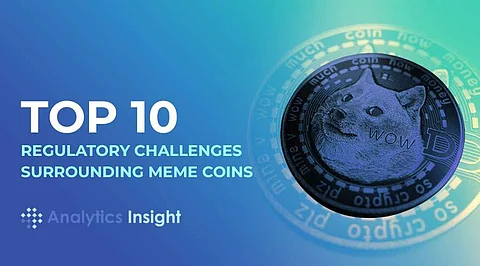

Meme coins are a cryptocurrency created and traded for fun, hype, or social media attention. They are usually inspired by popular memes, celebrities, events, or jokes and have little or no intrinsic value or utility. Some examples of meme coins are Dogecoin (DOGE), Shiba Inu (SHIB), Will Smith Slap Inu (WSS), and Big Eyes Coin (BIG).
Thanks to the viral power of social media platforms, influencers, and communities, Meme coins have gained popularity and profitability in recent years. However, they also pose significant risks and challenges for investors, traders, regulators, and the crypto industry as a whole. Here are some of the top regulatory challenges surrounding meme coins:
Meme coins are a diverse and dynamic crypto asset category that needs to fit neatly into existing legal frameworks and definitions. Depending on their features and functions, meme coins could be considered securities, commodities, currencies, or anything else. This creates uncertainty and confusion for regulators and market participants, who may need to learn how to apply or comply with the relevant laws and rules.
Meme coins are often created and launched by anonymous or pseudonymous developers, who may not disclose their identities, intentions, or affiliations. They may also need to provide information or documentation about the coin's technical specifications, governance structure, token distribution, or roadmap. This makes it difficult for regulators and investors to verify the legitimacy, credibility, or quality of the coin and its creators.
Meme coins are highly speculative and volatile, driven by hype, emotion, and herd mentality rather than fundamentals or rationality. They are also prone to manipulation, fraud, hacking, and theft. Many investors and traders participating in meme coin trading must know the risks or need more skills and knowledge to make informed decisions. They may also fall victim to scams, phishing, or pump-and-dump schemes that exploit their greed or fear.
Meme coins can significantly impact the crypto market as a whole, as they can affect the supply and demand of other crypto assets, the liquidity and efficiency of trading platforms, the security and reliability of network infrastructure, and the reputation and trust of the industry. Meme coins can also cause market distortions, bubbles, crashes, or contagion effects that could harm the interests of legitimate market participants and stakeholders.
Meme coins pose challenges for taxation and anti-money laundering (AML) authorities, who may need help tracking, monitoring, or enforcing their rules and regulations on meme coin transactions. Meme coins can be used for tax evasion, money laundering, terrorist financing, or other illicit activities, as they can facilitate anonymous, cross-border, and peer-to-peer transfers of value without intermediaries or oversight.
Meme coins are global and decentralized phenomena that transcend national borders and jurisdictions. They require a coordinated and cooperative approach from regulators across countries and regions, who may have different legal systems, standards, objectives, or priorities. However, such coordination and cooperation may be challenging or lacking due to political, economic, cultural, or technical barriers.
Meme coins may harm innovation and competition in the crypto industry, diverting resources, attention, or talent away from more valuable or meaningful projects or initiatives. They may also create entry barriers or unfair advantages for certain players or platforms that cater to meme coin trading or promotion.
Meme coins may reflect or reinforce a culture of greed, irresponsibility, or immaturity in the crypto community, as they may encourage or reward behaviors that are harmful, wasteful, or disrespectful to others. They may also undermine or erode the social, environmental, or humanitarian values or goals the crypto industry claims to uphold or pursue.
Meme coins may challenge regulators' authority, effectiveness, or credibility, who may need the legal powers, resources, or tools to enforce or deter violations of their rules or regulations on meme coin activities. They may also face resistance, opposition, or backlash from meme coin creators, traders, or supporters, who may view regulation as unnecessary, unwanted, or illegitimate.
Meme coins may challenge the relevance, adequacy, or suitability of existing regulatory frameworks and approaches for the crypto industry, as they may expose new gaps, issues, or opportunities that require new solutions or responses. They may also challenge the regulators to adapt and innovate their policies, practices, or mindsets to keep pace with the rapid and dynamic changes in the crypto space.
Join our WhatsApp Channel to get the latest news, exclusives and videos on WhatsApp
_____________
Disclaimer: Analytics Insight does not provide financial advice or guidance on cryptocurrencies and stocks. Also note that the cryptocurrencies mentioned/listed on the website could potentially be scams, i.e. designed to induce you to invest financial resources that may be lost forever and not be recoverable once investments are made. This article is provided for informational purposes and does not constitute investment advice. You are responsible for conducting your own research (DYOR) before making any investments. Read more about the financial risks involved here.
